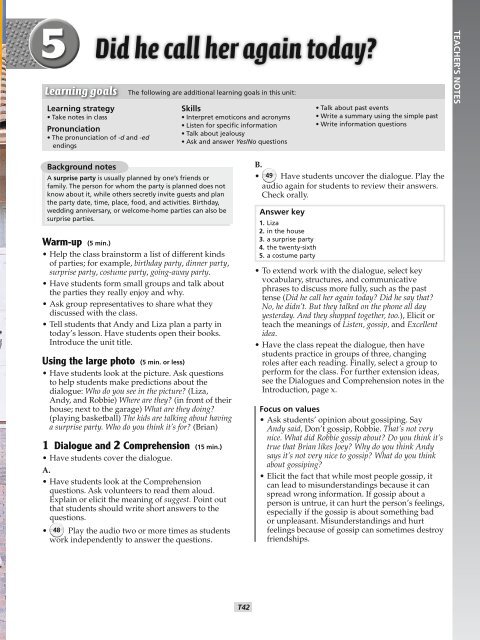English_Book_2-Teacher_300913
English_Book_2-Teacher_300913
English_Book_2-Teacher_300913
You also want an ePaper? Increase the reach of your titles
YUMPU automatically turns print PDFs into web optimized ePapers that Google loves.
Learning goalsLearning strategy• Take notes in classPronunciation• The pronunciation of -d and -edendingsThe following are additional learning goals in this unit:Skills• Interpret emoticons and acronyms• Listen for specific information• Talk about jealousy• Ask and answer Yes/No questions• Talk about past events• Write a summary using the simple past• Write information questionsTEACHER’S NOTESBackground notesA surprise party is usually planned by one’s friends orfamily. The person for whom the party is planned does notknow about it, while others secretly invite guests and planthe party date, time, place, food, and activities. Birthday,wedding anniversary, or welcome-home parties can also besurprise parties.Warm-up (5 min.)• Help the class brainstorm a list of different kindsof parties; for example, birthday party, dinner party,surprise party, costume party, going-away party.• Have students form small groups and talk aboutthe parties they really enjoy and why.• Ask group representatives to share what theydiscussed with the class.• Tell students that Andy and Liza plan a party intoday’s lesson. Have students open their books.Introduce the unit title.Using the large photo (5 min. or less)• Have students look at the picture. Ask questionsto help students make predictions about thedialogue: Who do you see in the picture? (Liza,Andy, and Robbie) Where are they? (in front of theirhouse; next to the garage) What are they doing?(playing basketball) The kids are talking about havinga surprise party. Who do you think it’s for? (Brian)1 Dialogue and 2 Comprehension (15 min.)• Have students cover the dialogue.A.• Have students look at the Comprehensionquestions. Ask volunteers to read them aloud.Explain or elicit the meaning of suggest. Point outthat students should write short answers to thequestions.• 48 Play the audio two or more times as studentswork independently to answer the questions.B.• 49 Have students uncover the dialogue. Play theaudio again for students to review their answers.Check orally.Answer key1. Liza2. in the house3. a surprise party4. the twenty-sixth5. a costume party• To extend work with the dialogue, select keyvocabulary, structures, and communicativephrases to discuss more fully, such as the pasttense (Did he call her again today? Did he say that?No, he didn’t. But they talked on the phone all dayyesterday. And they shopped together, too.), Elicit orteach the meanings of Listen, gossip, and Excellentidea.• Have the class repeat the dialogue, then havestudents practice in groups of three, changingroles after each reading. Finally, select a group toperform for the class. For further extension ideas,see the Dialogues and Comprehension notes in theIntroduction, page x.Focus on values• Ask students’ opinion about gossiping. SayAndy said, Don’t gossip, Robbie. That’s not verynice. What did Robbie gossip about? Do you think it’strue that Brian likes Joey? Why do you think Andysays it’s not very nice to gossip? What do you thinkabout gossiping?• Elicit the fact that while most people gossip, itcan lead to misunderstandings because it canspread wrong information. If gossip about aperson is untrue, it can hurt the person’s feelings,especially if the gossip is about something bador unpleasant. Misunderstandings and hurtfeelings because of gossip can sometimes destroyfriendships.T42:51:06 PMPostcards_splitB_TE1_U05.indd T422/27/07 10:21:11 AM




